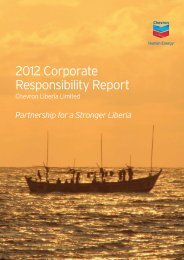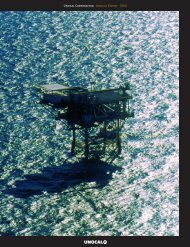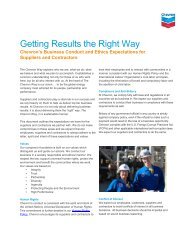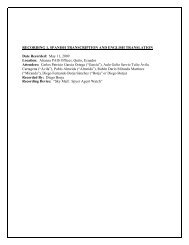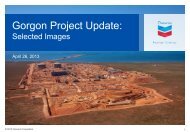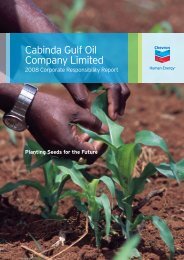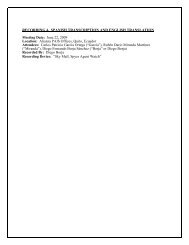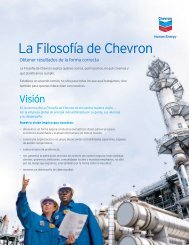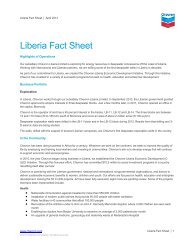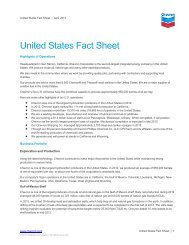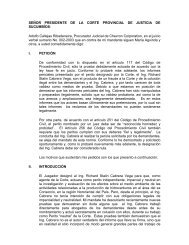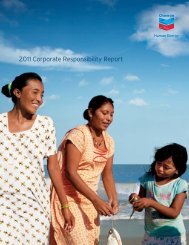Download PDF - Chevron
Download PDF - Chevron
Download PDF - Chevron
Create successful ePaper yourself
Turn your PDF publications into a flip-book with our unique Google optimized e-Paper software.
2002 <strong>Chevron</strong>Texaco Corporate Responsibility Report Social IssuesEngagement and DialogueCase Study >The Niger Delta illustrates some of the most difficult conditions <strong>Chevron</strong>Texacofaces anywhere. Poverty, ethnic and tribal tensions, and unstable law andorder are among the challenges faced by <strong>Chevron</strong> Nigeria Ltd. (CNL).<strong>Chevron</strong>’s Riverboat Clinic bringsmedical services to communitiesnear Escravos, Nigeria.Addressing Complex Challengesin NigeriaThe Escravos oil terminal, locatedin the Niger Delta and operated byCNL in partnership with the NigerianNational Petroleum Corp. (NNPC),processes up to 480,000 barrels ofoil a day. CNL employs 2,000 people,approximately 90 percent ofwhom are Nigerians. Three out offour CNL managers are Nigerian.“The Niger Delta presents extraordinary challenges for CNL and other companiesthat operate there,” says Robert Wasserstrom, a former ColumbiaUniversity anthropologist who is helping CNL redesign its community developmentstrategy. “In my view, this area is one of the most difficult socialenvironments in the world, especially after 37 years of military government.Traditional economies and social organizations have been severely damaged,leaving the area with no way to make consensus decisions or resolveconflict. Meanwhile, anger is growing among local villagers, who feel theyhave received few benefits from either oil companies or the government.”<strong>Chevron</strong>Texaco’s affiliates have operated in Nigeria for more than 40 yearsand, in that time, have worked to find means of helping to address thesecomplex challenges. As part of its commitment to contribute to the localcommunity, CNL has partnered with aid organizations, nongovernmentaland community-based organizations. CNL has spent more than US$90million on community development since the early 1990s for water andpower projects, roads, canals, jetties, schools and hospitals. Through theseefforts, CNL has learned much about engaging with local communities, tryingto make meaningful and sustainable contributions to social and economicdevelopment and working to support universal human rights.CNL is proud of the many positive impacts it has had on people’s lives – onthe more than 5,000 students per year who receive company-sponsoredscholarships or the thousands of villagers each year who receive medicalcare at CNL’s riverboat clinic. But CNL also recognizes that despite the company’sand its partners’ determination to help solve community problems,many of the region’s residents lack jobs, adequate clean water, education,training or health care.In the Niger Delta, frustrations overthese chronic problems at times swellinto protests, which sometimeshave become violent. Over the lastseveral years, CNL facilities andemployees have encountered severalIn the Niger Delta, thousands ofsuch situations, a powerful illustrationof the challenges of operatingmiles of rivers form the highwaysand communication routes forin the region. Faced with such difficultsituations, the company’s firsthundreds of villages that sit abovesome of the most oil-prolificpriority is always to protect people’sgeology in the world.safety, then to seek inclusive dialogueto resolve differences.In 1998, an incident involving a CNL facility ended in tragedy. In that case,200 militant youths seized the offshore Parabe oil production platform,holding close to 200 national and expatriate employees hostage, protestinginadequate job opportunities and demanding a substantial increase in communitydevelopment investments. In hopes of a peaceful resolution, CNLmanagement negotiated with the group’s representatives, but without success.When, after three days, the negotiations were not advancing, and thethreats against CNL employees held captive continued, Nigerian authoritieswere called in to restore order. When the military arrived, conflict ensuedbetween the Nigerian authorities and the protesters. Shots were fired, andtwo protesters were killed. CNL deeply regrets these deaths.In the summer of 2002, CNL’s commitment to peaceful resolution of conflictwas tested again, this time with a more positive outcome. Local womenoccupied CNL’s Escravos oil terminal, insisting that CNL provide municipalservices and facilities to their communities and create new jobs for the menin their villages. CNL managers halted oil operations, a critical step to protectpeople’s safety, and began discussions with the protesters. Ten dayslater, the occupation ended peacefully.Shortly after, CNL formed a partnership with several third-party developmentorganizations, including the United Nations Development Program(UNDP). CNL and UNDP will develop a coordinated master plan for separateDelta projects, such as building schools, roads and hospitals.Illustrating that the challenges will continue, in early 2003, militant youthsin the Delta region embarked on a violent protest against the local governmentprior to general elections in the country. This action led to communitymembers’ deaths, as well as significant loss of life among military personneland oil workers, and resulted in widespread destruction of homes and property.Acting quickly to protect lives, CNL shut down operations, mobilized its© 2003 <strong>Chevron</strong>Texaco Corporation. All Rights Reserved.10



